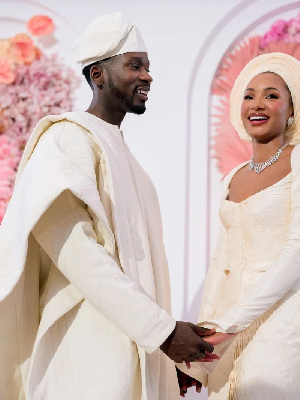Temi Otedola, actress and daughter of billionaire Femi Otedola, has set social media abuzz after officially changing her surname to “Ajibade” on Instagram, following her marriage to Nigerian singer Mr Eazi (Oluwatosin Ajibade).
The couple, who tied the knot in a series of lavish weddings across Monaco, Dubai, and Iceland in 2025, showcased a blend of Nigerian tradition and global flair.
From the Yoruba wedding at her family’s Dubai residence to the intimate church ceremony in Iceland, their union was a celebration of heritage, family, and love, capped by Temi’s public adoption of her husband’s name.
This move, however, has reignited an old debate in Nigerian feminist circles, whether a woman should take her husband’s surname or keep her maiden name.
Back in August, feminist commentator Rachelle (@omo_kosoko) caused waves on X when she declared:
“To every girl who is considering getting married, you CAN absolutely keep your name after marriage, and I think you should. Four years married now, I have relocated, had a baby, held a joint account, travelled solo with my child and not one issue. Don’t let anyone lie to you.”
Her statement drew mixed reactions. Barça Principal (@BarcaPrincipal) challenged the sentiment, asking,
“If you were married into the family of a Dangote, Adenuga, Otedola, Adeleke, or so, would you prefer to still keep your father’s name as surname? Note: I’m not against keeping your surname, I just want to establish something with the question.”
Others offered a more neutral stance, with @innershift05 stressing, “A name doesn’t hold a marriage together, character, loyalty, and shared vision do. Keep your name or change it, what matters is building a union that can’t be broken.”
This exchange sparked a nationwide discourse on identity, culture, and the expectations placed on married women, a conversation that has now resurfaced with Temi Otedola’s decision.
During an emotional moment at the wedding, Femi Otedola, known for his business empire and larger-than-life presence, offered a piece of advice to his daughter, “You have to succumb to your husband; he’s your boss. Temi, I wish you all the best in your future endeavours. You found a great guy. Very great guy. Blessed guy. He comes from a very decent family.”
His words, seen by some as traditional and by others as affectionate guidance, added more fuel to the ongoing cultural debate.
On X, the reactions came from all angles.
Some, like @_joelad, believed the entire uproar was unnecessary and rooted in overzealous feminism, stating that feminists were “doing too much” and that choice was what truly mattered, “If una neva mention feminists, your day never soft. Feminists are fighting for the right to choose. If she chose to take it, good for her. If she chose to keep ‘Otedola’, e still good. Any feminist who’s wailing is doing too much.”
Others praised the decision as a symbol of femininity and commitment.
@Mr_DaveChigozie applauded Temi’s move, calling it the kind of gesture men should expect in marriage, “Congratulations to her, that’s how feminine women move. They embrace their husband fully. As a man make sure you marry a woman that will embrace your surname fully.”
Some were more nuanced, like @WEB3_JUNKID, who recognised the traditional undertone but emphasised individual freedom, “Choosing to be submissive is nice, but everybody is entitled to their choices.”
Meanwhile, @NihinlolaOlowe brought a historical and cultural perspective, reminding followers that surname changes after marriage are not a traditional African norm but a colonial influence:, “Changing surname after marriage is Western culture, not African. In Nigeria, it’s not compulsory by law. Temi Otedola chose to change hers; that’s her decision. Respect women’s choices, don’t insult them.”
On Instagram, the discourse became a mix of humour, class commentary, and cultural expectation.
King_Otega mocked the debate by hinting that only “poor man’s daughters” insist on keeping their maiden names, “Poor man daughter go say she must keep her papa name o.”
Similarly, Makanakiiil took a jab at critics, suggesting their resistance was rooted in envy or lack of legacy, “As she should!!! All of you poor masses saying you wouldn’t drop your father’s name, why not live and kpai with your father Many of una no even dey proud of una papa name cos the man no get money.”
Some, however, struck a more neutral tone. Chubbitee simply defended personal choice, “That’s a choice she chose. Let others make their choices too.”
And for lucas_ugoh, the act symbolised devotion: “When a woman genuinely loves a man she respects and honours him .”
On Facebook, reactions mirrored the same class and cultural lines.
David Amto argued that the wealthy rarely complicate these matters, unlike those still struggling financially, “People with real wealth don’t make things hard on themselves, but you see poor man pikin with 1.2m net worth, them no dey rest.”
Divine Arthur proposed a middle path, suggesting Temi could have kept both names to honour both families, “If na me be her I for keep the two names oo, both her father’s own and her husband’s own.”
However, Esther Ndyip Tabat firmly reminded critics of tradition, “She didn’t end up with her father, please. Because even if she still carries her father’s name, her children must and will bear her husband’s name, Ajibade.”
Temi’s choice reflects a reality many Nigerian women face, navigating tradition, personal identity, and societal expectations.
Should a woman take her husband’s surname? Does keeping your maiden name signal independence or disrespect? Does changing it mean submission or unity?
At its core, this debate isn’t about Temi Otedola alone; it’s about choice, culture, and the evolving meaning of marriage.
Whether a name holds the power to define a woman’s place in her home or not remains a deeply personal decision, one that, as this saga shows, the public will always have an opinion on.
Entertainment of Saturday, 6 September 2025
Source: www.punchng.com













